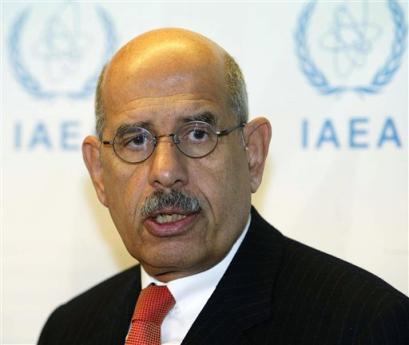|
U.N. atomic agency chief chides Iran
(Agencies)
Updated: 2005-03-01 09:00
The chief U.N. atomic watchdog chided Iran on Monday for delays in divulging
key information about its nuclear program, saying the onus is on Tehran to
overcome a "confidence deficit" caused by past cover-ups.
As Mohammed ElBaradei criticized Iran at a meeting of the International
Atomic Energy Agency, the Bush administration suggested it was considering a
major strategy shift — joining Europe in offering Tehran economic incentives to
abandon its uranium enrichment program.

Director General of the International Atomic Energy Agency
(IAEA) Mohamed ElBaradei delivers a press statement prior to the start of
the IAEA's 35-nation board of governors meeting, on Monday, Feb. 28, 2005,
at Vienna's International Center.
[AP] | Russia, meanwhile, sought to dismiss
concerns that an Iranian nuclear reactor it built and will supply with fuel
could be used to develop weapons. The accord signed Sunday is key to bringing
Tehran's first reactor on line.
The deal was struck despite American objections, although U.S. officials said
they could live with the pact because it was designed to eliminate the
possibility of the Iranians misusing the fuel for weapons.
More worrisome for the United States and European nations are Iran's plans to
enrich its own uranium.
While Iran says it wants the technology only to generate electricity, the
process can also produce weapons-grade material for warheads, and Washington
contends that is the main reason Tehran is interested in enrichment.
Iran has suspended work on enrichment pending negotiations with France,
Germany and Britain but has repeatedly said the freeze is of short duration,
despite European hopes that Tehran will commit to fully scrapping its program.
A two-year investigation by the U.N. nuclear agency established that Iran ran
a clandestine nuclear program, including uranium enrichment, for nearly two
decades.
In a new revelation of Iran's past covert activities, diplomats
said over the weekend that as early as 1987 Iran had received a written
offer from a nuclear black market network to set up the basics of an enrichment
program. They said the Iranians turned over the list to the agency only
recently.
Alluding to such delays in revealing illicit activities, ElBaradei spoke of
Tehran's "confidence deficit" and said only better cooperation from the Iranians
would "build the necessary confidence" to dispel concerns about their nuclear
aspirations.
Iran and North Korea are considered the greatest nuclear threats and the
board's meeting this week will focus on them. The agency has little leverage
with North Korea, which quit the agency two years ago and claims to have atomic
weapons.
The question of how to deal with Iran's nuclear program has brought two years
of stormy sessions for the Vienna-based agency's board, but that tension was
absent Monday.
During US President Bush's trip to Europe last week, leaders there urged him
to join them in offering economic incentives such as eventual membership for
Iran in the World Trade Organization. They argued a united front would be more
effective than a continuing U.S.-Europe split over how to deal with Iran.
Signaling a possible U.S. shift, White House spokesman Scott McClellan said
Monday that Bush "is thinking through some of the ideas that were discussed."
The European approach — offering a carrot to Tehran now along with the stick
of harsher actions if necessary — had been flatly rejected by the administration
ahead of the European trip.
Bush said Iran should not be rewarded, alleging past covert nuclear
activities violated the Nuclear Nonproliferation Treaty. He also protested
Iran's support for militant Arab groups in conflict with Israel, such as
Hezbollah in Lebanon.
However, as the trip progressed, the president seemed to exhibit more
flexibility. McClellan told reporters in Washington that Bush met with members
of his national security team Friday to discuss the European proposals to offer
incentives.
"The president spent a good portion of his time in Europe talking to our
European friends about Iran and listening to their ideas. We all share the same
goal of making sure Iran does not acquire a nuclear weapon. The president was
very much in a listening mode last week," McClellan said.
But while offering support for the diplomatic effort of Britain, France and
Germany, the administration gave no indication Bush would go along with European
urgings for the United States to join in their talks with Iran.
"The question of us sitting with Iran is not necessarily something that's
going to contribute to moving this process forward," State Department deputy
spokesman Adam Ereli said.
|